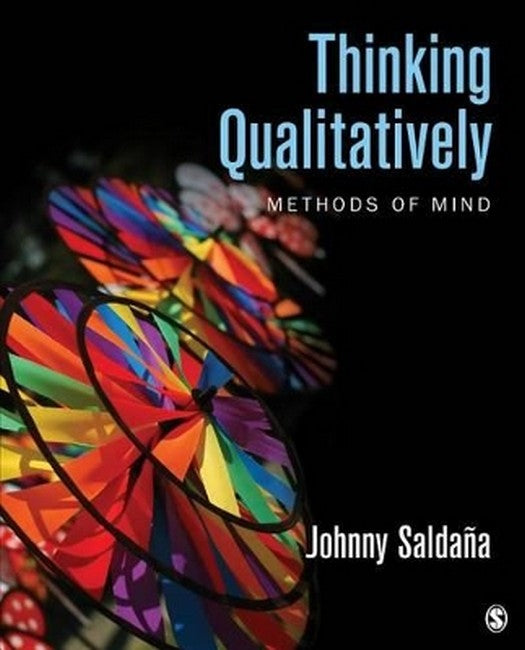Johnny Saldana is Professor Emeritus from Arizona State University's (ASU) School of Film, Dance, and Theatre in the Herberger Institute for Design and the Arts, where he taught from 1981 to 2014. He received his BFA in Drama and English Education in 1976, and MFA in Drama Education in 1979 from the University of Texas at Austin. Saldana is the author of Longitudinal Qualitative Research: Analyzing Change through Time (AltaMira Press, 2003); Fundamentals of Qualitative Research (Oxford University Press, 2011); Ethnotheatre: Research from Page to Stage (Left Coast Press, 2011); Thinking Qualitatively: Methods of Mind (Sage Publications, 2015); a commissioned title for Routledge's World Library of Educationalists Series, Writing Qualitatively: The Selected Works of Johnny Saldana (Routledge, 2018); co-author with the late Matthew B. Miles and A. Michael Huberman for Qualitative Data Analysis: A Methods Sourcebook (4th ed., Sage Publications, 2020); co-author with Matt Omasta for Qualitative Research: Analyzing Life (Sage Publications, 2018); and the editor of Ethnodrama: An Anthology of Reality Theatre (AltaMira Press, 2005). Previous editions of The Coding Manual for Qualitative Researchers have been translated into Korean, Turkish, and Chinese-Simplified. Saldana's methods works have been cited and referenced in more than 16,000 research studies conducted in over 130 countries in disciplines such as K-12 and higher education, medicine and health care, technology and social media, business and economics, government and social services, the fine arts, the social sciences, human development, and communication. He has published a wide range of research articles in journals such as Research in Drama Education, The Qualitative Report, Multicultural Perspectives, Youth Theatre Journal, Journal of Curriculum and Pedagogy, Teaching Theatre, Research Studies in Music Education, Cultural Studies ? Critical Methodologies, the International Journal of Qualitative Methods, the International Review of Qualitative Research, and Qualitative Inquiry, and has contributed several chapters to research methods handbooks. His most popular journal article, "Blue-Collar Qualitative Research: A Rant" (Qualitative Inquiry, 2014), has been downloaded by over 3,000 readers, according to ResearchGate. Saldana's research in qualitative inquiry, data analysis, and performance ethnography has received awards from the American Alliance for Theatre & Education, the National Communication Association-Ethnography Division, the American Educational Research Association's Qualitative Research Special Interest Group, New York University's Program in Educational Theatre, the Children's Theatre Foundation of America, and the ASU Herberger Institute for Design and the Arts.
Request Academic Copy
Please copy the ISBN for submitting review copy form
Description
List of Displays Preface Acknowledgements About the Author 1. Introduction: Thinking About Thinking 2. Thinking Analytically 3. Thinking Realistically 4. Thinking Symbolically 5. Thinking Ethically 6. Thinking Multidisciplinarily 7. Thinking Artistically 8. Thinking Summarily 9. Thinking Interpretively 10. Thinking Narratively 11. Closure: Thoughts about Thinking Glossary References Index
"This is book for all qualitative methodologists. Not just a "how-to" manual but an epistemological exercise in understanding qualitative methods." -- Cassie F. Quigley, Clemson University "This book fills an important void in the field. The market is crowded with books on techniques and strategies for conducting qualitative research. Saldana's volume provides a vital complement by encouraging students to develop the core analytical skills and interpretive frames they need to be truly successful in their research endeavors. He helps students flex and hone the epistemological muscles that are at the center of capable qualitative research." -- John P. Bartkowski, University of Texas at San Antonio "The focus of the book is clear and consistent. The writing is superb. It deals with sophisticated ideas in a clear and highly communicative style. It weaves important and relevant scholarship in ways that help the reader grasp the key ideas. It's one of the best books I have read (and I have read hundreds...). I will recommend it to all my doctoral advisees, as well as to the students in my classes." -- Liora Bresler, University of Illinois at Urbana-Champaign "Thinking Qualitatively invites students to think before they act, and offers a rich set of options for qualitative researchers to consider." -- Michael Brown, University of Wyoming "This book brings together key ways of thinking about our work as qualitative researchers. In many ways, it captures the breadth and depth of our work, while calling for us to be ever reflexive about our practices. I see this book as positively informing the work of novice and experienced researchers. It is a much needed addition to the qualitative research community." -- Jessica Nina Lester, Indiana University Thinking Qualitatively offers many notable strengths for readers looking to discover creative approaches to qualitative inquiry, both including and beyond thinking poetically. Throughout the book, Saldana provides detailed examples of qualitative reflection on interpersonal communication, paying strong attention to the nuances of these interactions. The exercises he includes at the end of each chapter create space for inquirers' emotions as well as our thoughts-a unique feature of the text that makes it not only exciting but also deeply affirming. -- Alexandra CH Nowakowski

